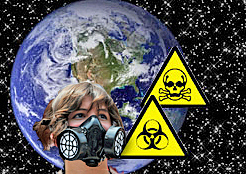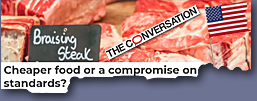 |
|
|
|
*In terms of food and environmental safety, both Brexit and a UK/US trade deal, has serious health implications *According to the American Cancer Society (ACS), the U.S. has a high cancer incidence rate *The environmental exposure to carcinogens ( air pollution, chemical exposure, and pesticides) contributes to this British farmers and food safety advocates are sounding the alarm over the recently struck trade agreement between the UK and the US, which promises to open the door to large-scale US agricultural exports, including beef and ethanol.
The UK government has insisted that it will not lower food standards, keeping bans on hormone-treated beef and chlorine-washed chicken. However, some critics remain unconvinced. US trade officials have hinted that food regulations should be driven by "science," which could increase pressure to lift current UK restrictions on certain food products. Public opinion in the UK strongly supports maintaining high food standards. Surveys show that a majority of British consumers reject hormone-fed beef and chlorinated chicken, prioritising animal welfare and food safety. Any shift toward US-style agricultural practices could spark backlash among the public. The language of the agreement, which promises to "enhance agricultural market access," has raised fears that this could be only the beginning. Food safety advocates worry about a gradual erosion of standards as commercial pressures mount. The industrial lobbyists in the United States have a strangle hold on both the US Senate and House of Representatives, and are increasingly involved in the UK's Parliament as lobbying groups pay MPs in the form of financial support and free staffing of some parliamentary offices. The NHS and the lobby involvement of businesses from the US and the UK, is a prime example of the policy pressures on the Government and opposition parties; making up a large percentage of advisors, policy development, and within the NHS itself.
Watch here: CWU's North West H&S Forum in April A list of chemicals used in the US and banned in the UK and the EU, along with the reasons for banning; can be found here: The Chemical Toxins That Seriously Damages Human Health And The Environment Potential Impact on UK Farmers Under the terms of the deal, the UK will allow 13,000 tonnes of US beef to enter tariff-free — a dramatic increase from the previous 1,000-tonne cap with a 20% tariff. In exchange, the US will grant a corresponding quota for UK beef exports. While the National Farmers' Union (NFU) welcomed the improved access to US markets, many UK farmers fear the influx of cheaper US beef could undercut local producers, who adhere to stricter welfare and environmental standards. US beef from feedlots in the Midwest is typically cheaper to produce, and farmers worry that this could put downward pressure on prices for UK cattle. The NFU has warned that this could be a “disaster” for British farming, and some major supermarkets like Tesco and Sainsbury’s have pledged to continue sourcing 100% British beef. However, farmers are concerned that cheaper US meat could enter wholesale and catering markets, undermining the UK’s meat sector. The deal also addresses the import of ethanol, a biofuel made primarily from crops like corn or wheat, which is used to reduce greenhouse gas emissions. The UK has agreed to lift a 19% tariff on US corn ethanol, allowing for a quota of 1.4 billion litres to be imported. But this move could harm UK bioethanol plants, which rely on British-grown wheat for production. These plants play a crucial role in supporting UK arable farming and rural economies. The NFU has warned that this could destabilize farm incomes, reduce local feed supplies, and even threaten the production of CO₂, which is widely used in food packaging, refrigeration, and carbonation in the UK. Will Cheaper Imports Benefit Consumers Or Harm Public Health And The NHS? Whilst it is argued by the Government that cheaper imports from the US could ease pressure on grocery bills in the UK, not all cheap food is healthy. The UK government already encourages people to reduce their red meat consumption for health reasons. A rise in the availability of cheaper beef could push consumption beyond recommended levels, with potential long-term health consequences.
Henry Dimbleby, the UK government’s former food strategy lead, has warned that cutting domestic standards for the sake of short-term savings could undermine public health and environmental sustainability. Food Safety and Public Confidence While the government insists that all imports will meet UK standards, future trade negotiations could challenge this position. Clear country-of-origin labelling and strict enforcement will be essential to maintaining consumer confidence. There’s also the risk of increased imports of highly processed US food products, such as cereals, snacks, and drinks. While these items are not inherently unsafe, many health advocates worry that an influx of cheaper, ultra-processed foods could exacerbate obesity and diabetes rates in the UK. Trade and the Bigger Picture Trade has its benefits, but food is not just another commodity — it touches on health, the environment, and rural life. The NFU warns that Britain’s high food standards should not be quietly traded away under pressure from US agribusiness. The UK government maintains that it has safeguarded food protections while opening up new trade opportunities. What remains to be seen is whether UK consumers will see real savings and whether supermarkets will stick to sourcing British meat. If not, the question becomes whether UK farmers can compete or be squeezed out altogether. Crucially, UK regulators must hold firm if the US pushes for changes to food standards. A successful trade deal should not just mean increased trade — it should lead to safer, healthier, and fairer food for everyone. Source: The Conversation / NFU / Gov.UK / DEFRA / EFSA / WHO / FDA USDA / unionsafety See also: The Chemical Toxins That Seriously Damages Human Health And The Environment
|

 While some have celebrated the deal as a breakthrough after stalled talks during the Biden administration, others warn it could undermine local producers, lower food safety standards, and even pose long-term health risks. With the cost of living remaining high, cheaper US imports may seem appealing to UK consumers, but many fear they could come at a major cost to food safety and environmental standards.
While some have celebrated the deal as a breakthrough after stalled talks during the Biden administration, others warn it could undermine local producers, lower food safety standards, and even pose long-term health risks. With the cost of living remaining high, cheaper US imports may seem appealing to UK consumers, but many fear they could come at a major cost to food safety and environmental standards. Further, as previously reported in this news item:
Further, as previously reported in this news item: 